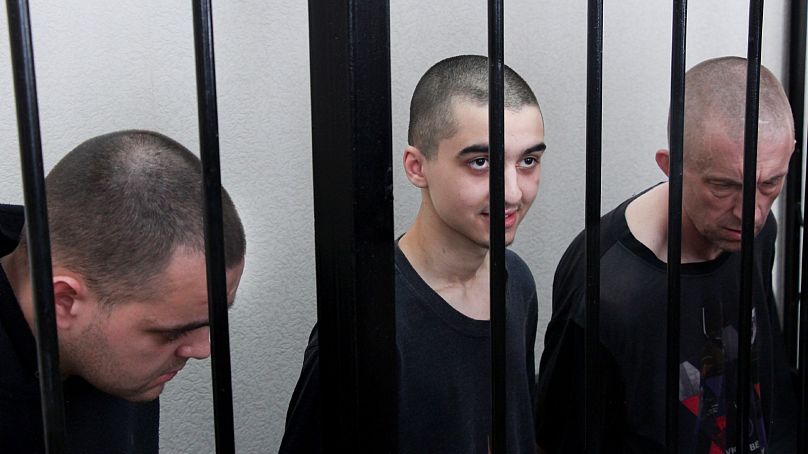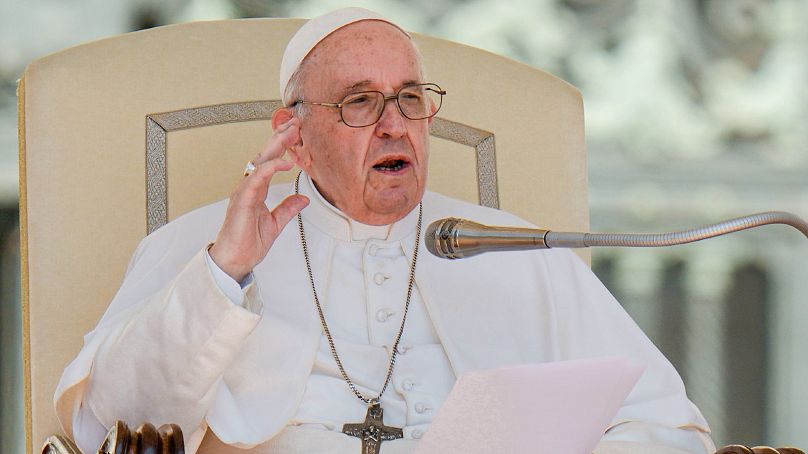From the latest on Sievierodonetsk to suggestions by the Pope that the war could have been provoked by NATO's expansion, here are five things you need to know about the Ukraine war today.
1. Humanitarian corridor set for Sievierodonetsk
Russia announced on Tuesday it is establishing a humanitarian corridor to evacuate civilians trapped at the Azot factory in Sievierodonetsk.
Under the plans, civilians will be brought to an area controlled by Russia on Wednesday.
"A humanitarian corridor will be opened in the direction of the north [to the city of Svatove] on June 15 from 05:00 GMT to 17:00 GMT, said the Russian Defense Ministry in a press release.
"The safe evacuation of all civilians, without exception, ... is guaranteed," it added.
According to local Ukrainian authorities, more than 500 people are currently sheltering in the large Azot chemical plant in Sievierodonetsk, which they say is under constant bombardment.
Earlier, Sergei Gaidai, the governor of Lugansk, said on social media that some 70% of Sievierodonetsk was now under Russian control, describing the situation for Ukrainian soldiers holding out in the city as "difficult, but under control".
He said Russian forces have destroyed the last bridge linking Sievierodonetsk to a Ukrainian-held city on the other side of the river, cutting off all routes of evacuation for those remaining in the city.
At the same time, the destruction of the last bridge across the river to the twin city of Lysychansk meant that it was impossible to deliver humanitarian supplies, he said, nor remove any civilians still in Sievierodonetsk.
2. Russia 'ready to listen' to UK plea for death row soldiers
Russia would be ready to consider a UK appeal over the fate of two Britons sentenced to death for fighting for Ukraine, the Kremlin said on Tuesday.
Kremlin spokesman Dmitry Peskov said neither Moscow nor the pro-Russian separatists in eastern Ukraine who passed the sentence had heard from London on the issue.
“You need to apply, of course, to the authorities of the country whose court passed the verdict, and that is not the Russian Federation,” Peskov said. “But, of course, everything will depend on appeals from London. And I am sure that the Russian side will be ready to listen.”
Earlier, British Foreign Secrettary Liz Truss said she will do "whatever necessary" to free two British nationals sentenced to death in the self-proclaimed Donetsk People's Republic (DPR).
Aiden Aslin, Shaun Pinner, and a Moroccan, Saaudun Brahim were handed the death sentence last week after they were captured fighting alongside Ukrainian forces.
Truss did not say what steps the UK government was taking to secure the release of the two men, although she suggested the best route was "though the Ukrainians".
In February, Truss said she supported people who wanted to travel and fight in Ukraine, arguing the war was a "battle for democracy".
3. Condemnation and praise from the Pope
Pope Francis has slammed the “ferocity and cruelty” of Russian troops in Ukraine while lauding the “heroism” and “courage” of Ukrainian forces.
Despite sharply criticising Russia’s invasion, the head of the Catholic church insisted there were no “good guys and bad guys”, suggesting Russia was provoked by NATO’s expansion east.
“Someone might say at this point: ‘But you are in favour of Putin!’ No, I’m not,” Francis said. “It would be simplistic and wrong to say such a thing.
"I am simply against reducing complexity to the distinction between good and bad, without thinking about roots and interests, which are very complex," he continued. "While we see the ferocity, the cruelty of the Russian troops, we must not forget the problems to try to solve them.”
Francis made the comments, which were published Tuesday in Italy's La Stampa and Avvenire, at a meeting with European editors of Jesuit journals last month.
4. Russian bans UK journalists and defence officials
Russia has banned dozens of British media and defence figures from entering the country, the Russian foreign ministry announced Tuesday.
In an statement on its website, the ministry described the ban on 29 journalists and commentators as a response to what it alleged was the British media’s skewed portrayal of Moscow and its actions in Ukraine.
“The British journalists included in the list are involved in the deliberate dissemination of false and one-sided information about Russia and events in Ukraine and the Donbas,” it said, referencing Ukraine’s industrial east, parts of which have been controlled by pro-Russian separatists since 2014.
The ministry claimed “with their biased assessments, they also contribute to fueling Russophobia in British society.”
Senior editors and correspondents for prominent print and broadcast outlets, such as the BBC, Sky News and the Times and Guardian newspapers, were featured on the list.
Also included were 20 figures linked to the UK’s defence establishment and industry, such as the head of the British navy, a junior defense minister and senior executives at the defence and aerospace firms Thales UK and BAE Systems.
5. European court rules against Russia's 'foreign agent' law
The European Court of Human Rights (ECHR) ruled on Tuesday that Russia's "foreign agents" law violates the rights of the groups designated as such.
In its ruling, Europe's top human rights court said the law violated the freedom of assembly and association of 73 Russian groups designated as foreign agents.
It ordered Moscow to pay many of them compensation.
Russia labels organisations and individuals it deems engaging in political activity with foreign support as "foreign agents", which carries Cold War connotations of spying.
Those designated as foreign agents must, by law, publish lengthy disclaimers alongside their publications. They are also subjected to costly and burdensome requirements of reporting their income and spending.
Kremlin spokesperson Dmitry Peskov said he would not comment on the ruling because Russia's parliament had ended the ECHR's jurisdiction in Russia, following legislation signed off last week.













